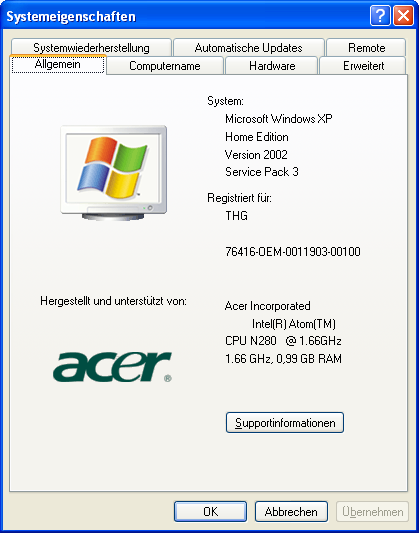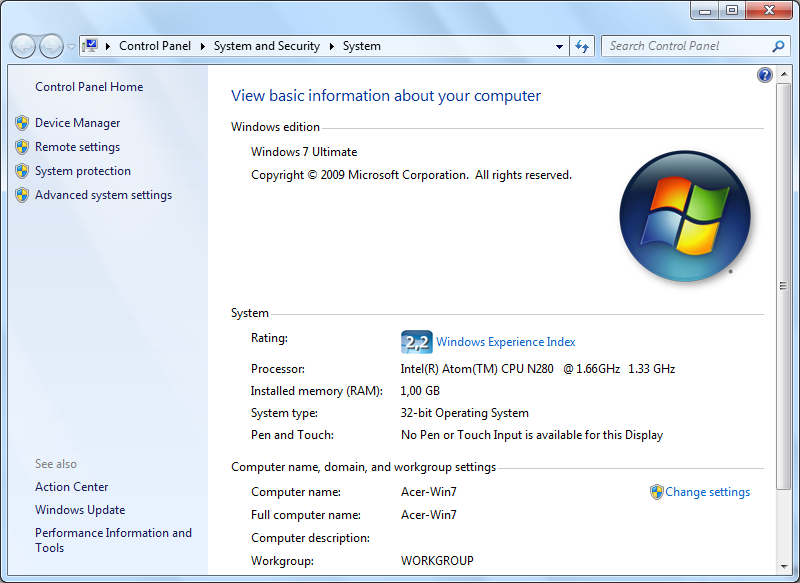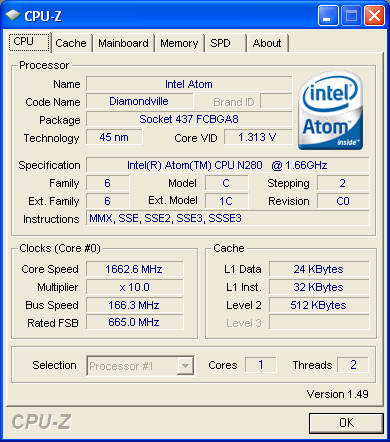Windows 7 Versus XP: Which Belongs On Your Netbook?
Test Hardware And Notes
We wanted to use a current netbook as our test platform for this review and settled on Acer’s Aspire One D150. Although it is still built around Intel’s aging 945GME chipset, it does use a slightly faster version of the Atom processor, namely the N280 running at 1.66 GHz.
Beyond that, the Aspire One D150 is a pretty standard netbook. It features a 10” display, integrated Intel GMA 950 chipset graphics, 160 GB of hard drive space, 1 GB of RAM, LAN, WiFi, Bluetooth, and the usual complement of USB ports. It comes with Windows XP Home Edition SP3 pre-installed. During testing, any tools and utilities installed by Acer were disabled or uninstalled. After ensuring the drivers were up to date, we put the little Acer through its paces in a number of benchmarks.
Next, we performed a clean install of the 32-bit version of Windows 7 RC1 from an external optical drive and repeated the benchmarkds. Since Microsoft provides a wide variety of drivers right on the installation disc and via Windows Update, we originally intended to perform testing using those versions. However, it turned out that some of these drivers were badly out of date and were holding back performance. Installing the most recent Vista drivers greatly improved the situation, which is why they were used for testing instead.
There is one drawback to this approach, though. With Windows 7, Microsoft has continued tweaking its Windows Display Driver Model (WDDM) originally introduced with Windows Vista. Compatible drivers enable certain desktop effects and acceleration features, even providing the basis for GPGPU computing (assuming the GPU features such functionality). Windows 7 uses the most recent version of this driver model, WDDM 1.1. The latest graphics driver available on Intel’s support and drivers page during testing only supports WDDM 1.0.
From a performance standpoint, we therefore recommend installing platform and graphics drivers manually and not relying on the versions provided by Microsoft. As newer performance-optimized releases become available for Windows 7, you can always switch to that version.
| Windows 7 Performance Check | |
|---|---|
| Model | Aspire One D150 |
| Manufacturer | Acer |
| Display Size (Resolution) | 10.2" glossy (1024 x 600), LED backlight |
| Hard Drive ( Capacity, Manufacturer, Model) | 160 GB, Western Digital WDC1600BEVT-22ZCT0, 5,400 rpm |
| Battery Capacity | 59 Wh / 5,800 mAh |
| CPU (Code Name) | Intel Atom N280 (Diamondville), 1.66 GHz (HT) |
| Chipset | Intel 945GME |
| Memory (Number of Modules) | 1024 MB DDR2-533 (1 x 1024 MB) |
| Graphics | Intel GMA 950 integrated |
| Audio | Realtek ALC272X |
| Webcam (Resolution) | 1.3 Mpixel |
| Connectivity | |
| USB 2.0 (Number and Location) | 3 (2 right, 1 left) |
| Display Connectors (VGA/DVI/HDMI/S-Video) | 1/-/-/- |
| Networking | Atheros AR8121/AR8113/AR8114 10/100 PCI-E |
| WiFi | Atheros AR5007EG 802.11 a/b/g |
| Card Reader (Formats) | SD, xD, MMC, MS, MS Pro |
| PC-Card/ExpressCard-Slot | - |
| Bluetooth (Generation) | 2.0 |
| Operating System And Drivers | |
| Operating System | Windows XP Home (SP3) Windows 7 RC 1 (Build 7100) |
| Platform Driver | Intel 9.1.0.1012 |
| Graphics Driver | Windows XP: Package 14.32.4 Windows 7: Package 15.8.3.1504 |
Get Tom's Hardware's best news and in-depth reviews, straight to your inbox.
Current page: Test Hardware And Notes
Prev Page Windows 7 On The Horizon Next Page Battery Life And Synthetic Benchmarks-
apache_lives LMAO just as i thought - its a vista renamed and flashed up a bit moreReply
i know - BUY MORE RAM - just might help a little? who knew! -
duckmanx88 apache_livesLMAO just as i thought - its a vista renamed and flashed up a bit morei know - BUY MORE RAM - just might help a little? who knew!Reply
did you even read the article? look at the results. read Benjamin's conclusion. its the moder interface of vista with the functionality of xp. and this is only an RC. who knows what'll happen until the October release. -
l0st_ins0mniac vista sucked ill stick with my xp 02 and 05 till i hear a bit more about win 07Reply -
mitch074 personally, I've found the solution:Reply
neither. I'm a running a Tux on me netbook. I pity da foo' running either da decrepit or da unwashed behind da ears OSes on them netbooks. -
harshavardhanr Windows RC1 installs the ULTIMATE edition by default whereas netbooks that come installed with Windows 7 will have the STARTER edition installed. The Starter edition should be able to perform better and last longer on netbooks because it is (supposedly) optimized for them. Also, it will have far fewer services running in the background compared to the Ultimate edition.Reply
Hence, the conclusion, THE ABOVE COMPARISON IS POINTLESS. -
bigdaddycool Windows 7 is much improved on Vista. Using Vista on a laptop is ok if you have enough cpu power/ram mostly to back it up.Reply
Windows 7 on the other hand in a real world test, say opening up like 10 internet explorers, photoshop and other things....... windows 7 will be alot snappier then Vista, also it uses less ram and less gpu power.
Ontop of that, by default Windows 7 selects the most appropriate power setting for the processor you are using.
Take notice, low-mid range cpu's will be set to Balanced, where as high performance cpu's like quad cores will be set to High Performance by default.
Microsoft took Vista (good gui product a lil run down running wise) and for a better word tweaked it out...... much like tuning a car.
The result is impressive I say for notebook and desktops. However, they really do need to fix their minor network issues and IE8 issues. -
YGDRASSIL Ultimate edition on a netbook and then complain about battery life. Hmmmm. Tommy is really losing it now. Wonder why I still come back here after the old good Tommy was brutally murdered.Reply -
Inneandar It would be nice to see some more 'practical' benchmarks like boot time, app launch times or media playback preformance imho... The conclusion already more or less indicates that win7 felt smooth, but this ain't something you're gonna prove running synthetics. I installed win7 recently on an old laptop (p IV, 512 Mb ram!) and to my opinion it is smoother than the xp previously on it (older install, admittedly). Together with the added functionality, this certainly tips the balance for me.Reply -
pbrigido Very good article! I was wondering with regards to the battery life difference between Win 7 and XP if all settings were set to a similar mode. The huge difference between the two OSs seems to be much larger than it should, even without the most current drivers for 7.Reply



